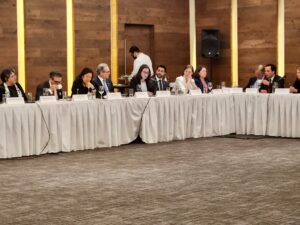
Aanii, Tabatha Bull n’indignikaaz, Nipissing n’indoonjibaa, Migizi dodem. Hello. My name is Tabatha Bull. I am a member of Nipissing First Nation, and the Eagle Clan.
As President and CEO of Canadian Council for Aboriginal Business, I want to acknowledge all the distinguished guests including the Secretaries and Ministers and fellow business leaders.
The Indigenous economy can have a significant impact on North America. Indigenous peoples were not only the first people in all of our countries, but in Canada we are the fastest growing population. An incredible opportunity exists, with proper supports to solve the skills shortages we have been speaking about today.
As business owners we are a solution to supply chain issues. In Canada, there are 65,000 Indigenous businesses across a wide range of sectors who supply to governments and private sector and are heavily involved in trade. While seven percent of Indigenous-owned SMEs in Canada are exporters, slightly less than non-Indigenous SMEs. smaller Indigenous entrepreneurs, export at the same rate.
Significantly, this apparent success on the part of Indigenous businesses has been reached largely without specific supports, demonstrating the resilience of the Indigenous economy. Implementing specific supports for Indigenous entrepreneurs would allow more of them to be successful which would lead to greater success in the economies of all three countries. This includes supports for us to work together with our Indigenous relatives across what we call Turtle Island.
While CUSMA was a step forward in that it mentioned Indigenous peoples in some provisions, further steps are important to facilitate increased Indigenous participation in these agreements and conversations to generate the outcomes intended with these provisions. These include:
- Ensuring clear definitions of Indigenous business within free trade agreements, particularly those found within CUSMA, such as Chapter 6.1 which are currently limited in their usefulness due to lack of such
- Implementing specific provisions regarding Indigenous businesses and set-asides within FTAs, such as ensuring that CUSMA Ch. 13 on Government Procurement applies to Indigenous businesses in all three countries, and;
- Strengthening collaboration by Canada, the USA, and Mexico on activities to promote SMEs owned by ”under-represented groups”, Indigenous peoples, women,2SLGBTQ+, in line with CUSMA Ch. 25 on Small and Medium-sized Enterprises.
Supporting Indigenous inclusion and leadership in discussions is important given the emerging focus on energy transition, resource development and the need to supply resources to a growing North American and global economy. Resource development in Canada and the rest of North America occurs on the traditional territories of Indigenous peoples. As the original stewards of the land, they need seats at those tables to ensure development occurs sustainably, that the needs of their communities are met, and they share appropriately in the benefits of the development. Indigenous inclusion de-risks projects because it’s the right thing to do and builds community support by allowing for substantive involvement, allowing access to resources and projects to go forward that may otherwise be stalled. By ensuring this Indigenous involvement and granting those seats at the table early, countries and corporations will further facilitate these developments, instead of creating barriers and roadblocks.
Living up to the principles of UNDRIP will further certainty. Giving the rightful stewards of the land a more prominent role in conversations relating to economic and resource development leads to greater transparency, predictability, stability, accountability, and satisfies due process. Giving a voice to Indigenous people creates partners and allies instead of protests.
Turtle Island has been a land of trading nations since time immemorial. The history of International Indigenous trade is well documented and was active before the establishment of Canada, the United States, and Mexico, even providing the foundation for their development. If the first peoples of these countries laid the foundation for their prosperity in the past, engaging with Indigenous peoples and eliminating impediments is the way to gain and ensure prosperity into the future, not just for Indigenous peoples but for all North America.
Given the importance of expanding economic prosperity, ensuring supply chain resiliency and access to the resources and opportunities that will pave the way for success for the North American economy, the time for Indigenous inclusion is NOW, the time for benefits-sharing is NOW, and the time for partnerships is NOW.
Chi Miigwetch for hearing my words this morning and your commitment to have our voices here in the future.

